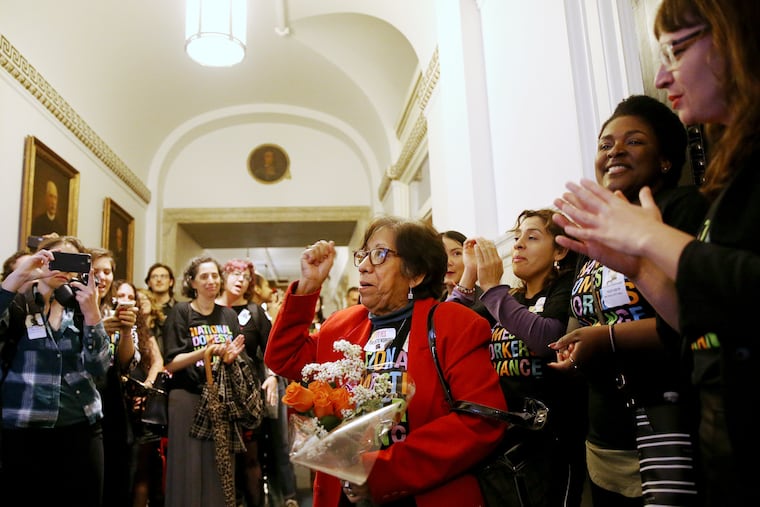Law protecting Philadelphia domestic workers takes effect as they’re losing jobs in droves
The legislation goes into effect in the middle of a pandemic that’s left many of these workers — who are often undocumented immigrants — jobless and unable to qualify for federal assistance.

Alejandra has been living at work for a month. She expects to live there for another month, at least.
In normal time, the 28-year-old lives in South Philly. She’s a nanny to a 5-month-old who, prior to the coronavirus pandemic, she cared for during daytime hours. To avoid losing her only source of income, Alejandra last month agreed to be a live-in through the worst of the pandemic and quarantine with the family who employs her.
A typical day is 8 a.m. to 6 p.m. There are no built-in breaks, and she has no contract. Formalizing her employment in such a way wasn’t legally required. Until now.
Philadelphia’s Domestic Workers Bill of Rights, a law aimed at protecting the city’s 16,000 nannies, house cleaners, and home care workers, takes effect Friday, in the middle of a pandemic that’s left a huge portion of these workers — mostly women of color, many undocumented immigrants — jobless and unable to qualify for federal assistance.
It’s a crisis for the 2.5 million domestic workers nationwide who average $10 an hour, often lack health care, and a quarter of whom already lived below the poverty line. Those still able to find jobs put themselves at risk, working in close quarters with clients or scrubbing strangers’ homes to fend off the virus.
Philadelphia’s new law, which advocates say is some of the strongest domestic-worker legislation in the nation, stipulates employers and workers have a written agreement outlining pay rates, schedules, and benefits. It also requires advance notice of termination, a provision newly relevant as families cut in-home workers in droves.
For Alejandra, the part of the law that will change her life most as she lives at work is the required breaks.
“It does make a difference to rest 10 minutes,” she said, “just to stop.”
» READ MORE: ‘Every day is a fresh hell’ for undocumented domestic workers in a world turned upside down by coronavirus
Alejandra, who asked to be identified only by her first name to speak freely about her employment, is a member of the Pennsylvania chapter of the National Domestic Workers Alliance, which began pressing Philadelphia officials in 2018 to adopt legislation allowing domestic workers — barred from unionizing under federal law — to access benefits and discrimination protection.
Outside Philadelphia, which passed the bill last fall, nine states and Seattle have domestic-worker protection legislation on the books. A federal bill has also been introduced.
One provision in Philadelphia’s legislation won’t yet take effect. The law establishes the country’s first “portable benefits system,” a platform workers with multiple employers can use to accrue paid time off. That won’t be implemented until the end of the year as the city selects a vendor and irons out the system.
What will take effect are new protections for domestic workers, including now being covered under antidiscrimination laws in Philadelphia, and new labor standards like paid meal and rest breaks. (Domestic workers remain carved out of minimum-wage and overtime protections.)
The law doesn’t apply for “casual” domestic workers or caregivers who are partners or family members.
What could prove most needed during the pandemic is the requirement of written agreements, said Nicole Kligerman, director of the Pennsylvania Domestic Workers Alliance. Some nannies and caregivers may negotiate what a “pandemic quarantine” looks like before signing a contract. House cleaners might codify an employer’s responsibility to provide disinfectant, gloves, and masks, now commodity items.
The law also established the Domestic Workers Standards and Implementation Task Force, a group that has representation from workers and will monitor enforcement.
“The group doesn’t feel like the fight is over. We have the law,” Alejandra said. “The next big step is it has to be followed. We need to make sure the consequences are real.”
» READ MORE: Here’s how new labor protections for Philly’s domestic workers would be applied
For now, the Alliance is also focused on short-term needs and raising money for direct cash assistance to the domestic workers who call daily about losing jobs, running out of money, and staring into empty cupboards. Undocumented immigrants and workers paid in cash weren’t eligible for $1,200 stimulus checks from the federal government.
Plenty are skipping rent payments, as evictions in the city are on hold through the end of May.
“But," Kligerman said, “that will be an avalanche of problems later.”
The Philadelphia Inquirer is one of more than 20 news organizations producing Broke in Philly, a collaborative reporting project on solutions to poverty and the city’s push toward economic justice. See all of our reporting at brokeinphilly.org.